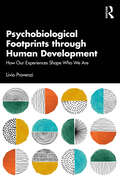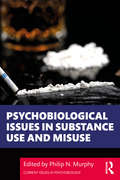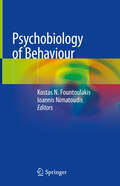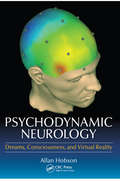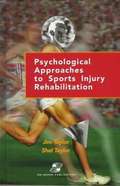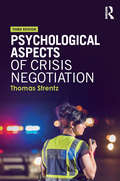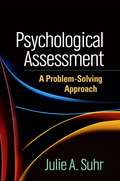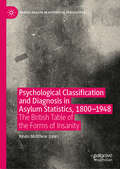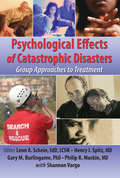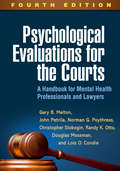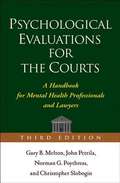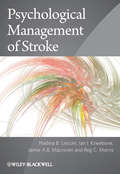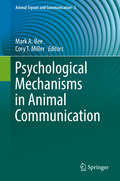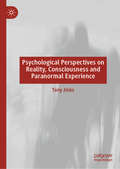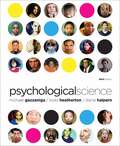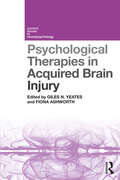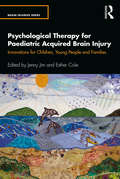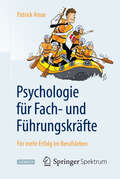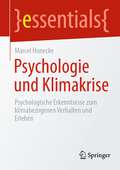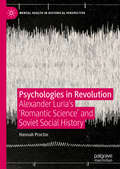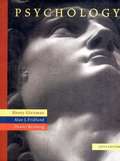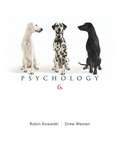- Table View
- List View
Psychobiological Footprints through Human Development: How Our Experiences Shape Who We Are
by Livio ProvenziEmbark on an illuminating voyage through the biological foundations of human nature and development with Psychobiological Footprints through Human Development. This unique volume unveils the intricate dance between genetics, neuroscience, and environment, offering a holistic understanding of how we become who we are.This comprehensive book examines the psychobiological, neuroendocrine, and epigenetic mechanisms that regulate developmental processes in typical development and under conditions of developmental risk. Moving within a dynamic systems epistemic framework and capitalizing from the heritage of the infant research field, it provides a solid framework for comprehending the interplay of nature and nurture. With a captivating blend of theoretical principles, processes, and contextual applications, this book transcends academic boundaries to empower anyone interested in the intricacies of human development.Psychobiological Footprints through Human Development is a guide to discovering how our life experiences contribute to making us who we are and therefore it is invaluable to graduate students in the fields of developmental psychology, neuroscience, genetics, and related disciplines. Delving into the biological roots of behaviour, cognition, and emotion, it will also equip practitioners, researchers, and educators with invaluable insights to enrich their practice.
Psychobiological Issues in Substance Use and Misuse (Current Issues in Psychobiology)
by Philip N. MurphyIn this book, Murphy brings together a team of international experts to review cutting-edge scientific literature from the field of psychobiology and related disciplines which addresses important questions and broadens our understanding of substance use behaviours. The reader is introduced to the multi-faceted nature of substance use and misuse, and its growing need to be discussed across diverse disciplines and perspectives. The book also addresses important questions regarding public policy and professional practice in the context of different social and cultural environments, and comments on the methodological and ethical issues in substance use and misuse. Chapters explore a spectrum of substances, which include: cocaine, alcohol, ecstasy (MDMA), methamphetamine, synthetic cannabinoids, tobacco, ketamine, novel psychoactive substances, and vaping products. The use of these substances poses important questions for science and for society. This book is written to help academics, practitioners, and students in a variety of academic and professional disciplines answer those questions while staying up to date with the psychobiological literature. This is a vital resource for professionals and upper-level undergraduate and postgraduate students undertaking research in areas related to biological psychology, biology, health studies, and medicine.
Psychobiology of Behaviour
by Kostas N. Fountoulakis Ioannis NimatoudisThe book provides a comprehensive reference on the neurobiological understanding of behaviour, how behaviour is regulated by the brain, and how such behaviours in turn influence the brain. The work offers an introduction to neural systems and genetics/epigenetics, followed by detailed study of a wide range of behaviours – temperament and personality, instincts and drives, memory and cognitive function, sex and sexual differentiation, ethology and evolutionary biology, aging, drug abuse and other problematic behaviors, psychophysiology and ultimately the links to biological psychiatry and psychopharmacology. Research findings on the neural basis of social behaviour are integrated across different levels of analysis, from molecular neurobiology and neural systems/behavioural neuroscience to fMRI imaging data on human social behaviour. The content covers research on both normal and abnormal behaviours, as well as developmental aspects. The target audience includes psychiatrists, neurologists, nurses, psychologists and all researchers and advanced students in behavioural, social and developmental neuroscience, as well as clinical neuroscientists.
Psychodynamic Neurology: Dreams, Consciousness, and Virtual Reality
by Allan HobsonPsychodynamic Neurology: Dreams, Consciousness, and Virtual Realty presents a novel way of thinking about the value of dreaming, based in solid comprehension of scientific research on sleep and dreams, but with deep understanding of psychoanalytic and other interpretations of dreams. <P><P>This book: <li>Surveys the remarkable history of sleep research over the past few decades <li>Examines the neurobiology of sleep and its implications for consciousness and well-being <li>Addresses the nature of waking and dreaming consciousness and how they are deeply related <li>Presents the neurogenesis, function, and clinical importance of a brain-based dream theory <P><P>Our dreams are a mixture of anticipated virtual as well as remembered real experience. This book tells the story of how neuroscience has helped us reach this startling and exciting conclusion and how the new scientific model builds upon and departs from the dream theories of the past.
Psychological Approaches to Sports Injury Rehabilitation
by Jim Taylor Shel TaylorIn dedicating this guide for rehabilitation specialists, consultants J. Taylor and S. Taylor (U. of Connecticut Health Center, Farmington) refer to frustration and patience as well as to pain and expertise, recognizing that bouncing back from sidelining sports injuries entails mind as well as body. Augmented by celebrity soundbites, the authors detail the referral process for assessing psychological problems; mental influences on rehabilitation (motivation, anxiety, focus); facilitatitive techniques (imagery, using negative thinking positively, pain management, social support); return to the sport; and development of a psychological rehab program (with sample forms, program prescription summaries). Annotation c. by Book News, Inc., Portland, Or.
Psychological Aspects of Crisis Negotiation
by Thomas StrentzPsychological Aspects of Crisis Negotiation, Third Edition, explores the methods and strategies for confronting the nine types of subjects typically encountered in hostage/suicide sieges by correctional staff and law enforcement crisis negotiators. Strentz, an experienced negotiator who designed and directed the FBI’s hostage negotiator program, lays out the critical elements that are required for a successful encounter with a hostage taker or other malfeasant. This book highlights psychological dynamics of negotiations as they apply to the negotiator, the hostage, and the subject. It discusses the predictors of surrender versus the need for a tactical intervention and examines the phases of a hostage crisis and the changing focus as the crisis develops. Referencing historical events such as the Bay of Pigs invasion and the Challenger and Columbia incidents, this text demonstrates how faulty group decision making can spell tragedy. Enhanced with case studies to put the material into context, this third edition also includes new chapters on the SWAT team/crisis negotiator interface and on the genesis of the increased incidence of mentally ill hostage takers. Based on decades of experience in the fi eld and practical advice from a national expert, this volume arms negotiators with the knowledge and tools they need to defuse crises and increase the odds that hostages will survive.
Psychological Assessment
by Julie A. SuhrThis authoritative clinical reference and text provides a complete guide to conducting empirically based assessments to support accurate diagnoses and better clinical care. The book builds crucial skills for gathering and interpreting data for specific assessment purposes. It also presents more advanced ways to integrate information from tests, interviews, observations, and other sources, within a biopsychosocial framework that fully addresses the needs of each client. Particular attention is given to accounting for potential biases that affect every stage of the decision-making process. User-friendly features include case examples, advice on writing reports and giving feedback to clients, and a detailed sample report.
Psychological Classification and Diagnosis in Asylum Statistics, 1800 - 1948: The British Table of the Forms of Insanity (Mental Health in Historical Perspective)
by Kevin Matthew JonesThis book provides a detailed examination of the questions that preoccupied British alienists throughout the second half of the nineteenth century. Was insanity one disorder with different forms or a set of distinct natural kinds that each had different causes, symptoms, and outlooks? Was it possible to devise a standardised classification of the insanities that provides a scientific basis to psychological diagnosis? Could statistics on psychological diagnosis provide data to help reveal the nature of insanity? The classification at the centre of these debates, the Medico-Psychological Association’s Table of the Forms of Insanity, caused deep divisions that took decades to resolve and hampered efforts to develop asylum medical statistics on psychological diagnosis. The use of the classification in national medical statistics was tantamount to being the standard classification for the asylum. As the appeal of statistics grew within medical circles, the debates intensified, and the divisions grew deeper. Despite lofty aims and years of debate, attempts to develop national statistics on psychological diagnosis had achieved very little by the beginning of the twentieth century. The failure of these efforts, hampered by the unwieldy processes adopted by Lunacy administration, led to the Table of the Forms falling into obscurity after its final set of revisions in 1932. In presenting for the first time the debates surrounding the Table of the Forms of Insanity, this volume calls for a re-evaluation of the history of psychiatric classification through its exploration of the underappreciated links between the standardisation of psychological diagnosis and the development of mental health statistics. By interrogating the links between asylum governance and the clinic, this book presents considerations on classification that still resound today, and provides valuable reading for scholars interested in the social history of medicine, the history of psychiatry, and the history of science.
Psychological Effects of Catastrophic Disasters: Group Approaches to Treatment
by Philip R. Muskin Joseph Rose Henry I Spitz Leon Schein Gary BurlingameA thorough, user-friendly guide of basic knowledge and group interventions for psychological trauma from terrorist attacks and other catastrophic disastersThere is relatively little literature on the psychological trauma caused by catastrophic disasters, including terrorist attacks and the impending threats of terrorism. Psychological Effects of Catastrophic Disasters: Group Approaches to Treatment fills that gap by comprehensively discussing ways to minimize the psychological damage resulting from catastrophic disasters as well as the trauma developed from the threat of future terrorist attacks. The book provides thorough presentations of almost manualized group methods for the prevention and treatment of the acute and longer-term psychological effects for children, adolescents, and adults.Appropriate treatment immediately after a catastrophe can diminish harmful psychological effects, enhance an individual&’s quality of life, decrease psychosomatic illnesses and the exacerbation of chronic medical conditions, increase the effective utilization of medical facilities, and decrease medical expenses. In this book, internationally renowned authorities provide practical expert suggestions and helpful examples to illustrate the interventions and provide a quick reference for professionals facing the aftermath of prospective terrorist disasters and other catastrophic events. Psychological Effects of Catastrophic Disasters: Group Approaches to Treatment is divided into four sections. The first section provides an overview of the book; the second discusses the foundations and broad issues which potentially affect the outcome of group treatment; the third section presents group models which address the particular needs of children, adolescents, parents, emergency service personnel, and mental health practitioners; and the fourth part considers future directions of treatment. Designed to be used as a comprehensive single source for professionals working with victims of trauma caused by terrorism or catastrophic disaster, this book can be read and used in its entirety, or specific chapters detailing treatments can be chosen and used independently as needed. Extensive references allow opportunities for further research.Psychological Effects of Catastrophic Disasters: Group Approaches to Treatment presents unique first-person accounts of September 11th and examines: the neurobiological effects of a traumatic disaster the effective use of psychotropic medication the implications of living with ongoing terrorist threats a new framework for preparedness and response to disasters and trauma for children and families cultural, religious, and ethnic differences related to the prevention and treatment of psychological sequelae the diagnosis and treatment of traumatic grief retraumatization, distressing reminders, and their effects on post-traumatic adjustment the knowledge trauma therapists need to integrate small group principles the diagnosis and group treatment of acute and long-term effects with adults and children the use of spiritual principles after a terrorist disaster or catastrophic event nine types of groups appropriate for specific populationsPsychological Effects of Catastrophic Disasters: Group Approaches to Treatment is a timely, comprehensive reference for social workers, psychologists, psychiatrists, health professionals, mental health professionals, educators, and students.The royalties from this book shall be donated to organizations which provide direct services to those who continue to be affected by the events of September 11th, 2001 and Hurricane Katrina (August 29th, 2005).
Psychological Evaluations for the Courts, Fourth Edition: A Handbook for Mental Health Professionals and Lawyers
by John Petrila Randy K. Otto Gary B. Melton Norman G. Poythress Christopher Slobogin Douglas Mossman Lois O. CondieTens of thousands of readers have relied on this leading text and practitioner reference--now revised and updated--to understand the issues the legal system most commonly asks mental health professionals to address. Highly readable, the volume demystifies the forensic psychological assessment process and provides guidelines for participating effectively and ethically in legal proceedings. Presented are clinical and legal concepts and evidence-based assessment procedures pertaining to criminal and civil competencies, the insanity defense and related doctrines, sentencing, civil commitment, personal injury claims, antidiscrimination laws, child custody, juvenile justice, and other justice-related areas. Case examples, exercises, and a glossary facilitate learning; 19 sample reports illustrate how to conduct and write up thorough, legally admissible evaluations. New to This Edition *Extensively revised to reflect important legal, empirical, and clinical developments. *Increased attention to medical and neuroscientific research. *New protocols relevant to competence, risk assessment, child custody, and mental injury evaluations. *Updates on insanity, sentencing, civil commitment, the Americans with Disabilities Act, Social Security, juvenile and family law, and the admissibility of expert testimony. *Material on immigration law (including a sample report) and international law. *New and revised sample reports.
Psychological Evaluations for the Courts, Third Edition
by Gary Melton John PetrilaThis is the definitive reference and text for both mental health and legal professionals. The authors offer a uniquely comprehensive discussion of the legal and clinical contexts of forensic assessment, along with best-practice guidelines for participating effectively and ethically in a wide range of criminal and civil proceedings. Presented are findings, instruments, and procedures related to criminal and civil competencies, civil commitment, sentencing, personal injury claims, antidiscrimination laws, child custody, juvenile justice, and more.
Psychological Management of Stroke
by Ian I. Kneebone Jamie A. Macniven Nadina B. Lincoln Reg C. MorrisPsychological Management of Stroke presents a review and synthesis of the current theory and data relating to the assessment, treatment, and psychological aspects of stroke.Provides comprehensive reviews of evidence based practice relating to strokeWritten by clinical psychologists working in stroke servicesCovers a broad range of psychological aspects, including fitness to drive, decision making, prevention of stroke, and involvement of carers and familiesReviews and synthesizes new data across a wide range of areas relevant to stroke and the assessment, treatment, and care of stroke survivors and their familiesRepresents a novel approach to the application of psychological theory and principles in the stroke field
Psychological Mechanisms in Animal Communication
by Mark A. Bee Cory T. MillerThis book analyzes the psychological mechanisms critical to animal communication. The topics covered range from signal neurons to broad-scale phylogenetic patterns, shedding new light on the sensory, perceptual, and cognitive processes that underlie the communicative behaviors of signalers and receivers alike. In so doing, the contributing authors collectively integrate research questions and methods from behavioral ecology, cognitive ethology, comparative psychology, evolutionary biology, sensory ecology, and neuroscience. No less broad is the volume's taxonomic coverage, which spans bees to blackbirds to baboons. The ultimate goal of the book is to stimulate additional research into the diversity and evolution of the psychological mechanisms that make animal communication possible.
Psychological Perspectives on Reality, Consciousness and Paranormal Experience
by Tony JinksThis book explores various explanatory frameworks for paranormal encounters. It opens with the story of an inexplicable human figure seen crossing a secluded hotel corridor, interpreted as a ghost by the sole witness. The subsequent chapters explore the three most important historical perspectives accounting for this and other types of paranormal experience. Each perspective is examined from first principles, with specific reference to what happened in the corridor, how it happened, why it happened, and who might be responsible. The first perspective considers the experience to be legitimate – to be something real – and various possibilities are presented that are grounded in the paranormal and parapsychological literature, among which a “ghost” is one putative explanation. In turn, the second perspective treats the experience as being wholly illegitimate. With reference to psychological theory, the ghost sighting is a product of erroneous consciousness. The third perspective is different yet again, and considers the sighting to be authentic, but argues that explaining the ghost requires a radical departure from conventional models of reality and consciousness. By contrasting these three paths, the book provides a valuable resource for readers interested in the philosophical and psychological origins of explanations for paranormal experiences, from the 19th century to the present. It will appeal to general readers in addition to students and scholars of parapsychology, anomalistic psychology, and consciousness studies.
Psychological Science (3rd Edition)
by Michael S. Gazzaniga Diane F. Halpern Todd F. HeathertonThis edition presents the latest developments in psychology in an engaging, visually stimulating format. The text enhances student understanding and stimulates active learning with Halpern's unique science-of-learning pedagogical system; relevant, real world examples; and an art program tailored especially for visual learners. Instructors and students will benefit from the most integrated media package available for an introductory course.
Psychological Therapies in Acquired Brain Injury (Current Issues in Neuropsychology)
by Fiona Ashworth Giles N. YeatesThe psychological impact of an acquired brain injury (ABI) can be devastating for both the person involved and their family. This book describes the different types of psychological therapies used to ameliorate psychological distress following ABI. Each chapter presents a new therapeutic approach by experts in the area. Readers will learn about the key principles and techniques of the therapy alongside its application to a specific case following ABI. In addition, readers will gain insight into which approach may be most beneficial to whom as well as those where there may be additional challenges. Covering a wide array of psychological therapies, samples range from more historically traditional approaches to those more recently developed. Psychological Therapies in Acquired Brain Injury will be of great interest to clinicians and researchers working in brain injury rehabilitation, as well as practitioners, researchers and students of psychology, neuropsychology and rehabilitation.
Psychological Therapy for Paediatric Acquired Brain Injury: Innovations for Children, Young People and Families (The Brain Injuries Series)
by Jenny Jim Esther ColeChildren, young people and families living with an acquired brain injury (ABI), whether through accident, illness, injury or abuse, are rarely offered psychological therapy, and yet the benefits of such interventions can be profound. This important new book, providing a selection of practice examples and insights from frontline practitioners, will be essential reading for any paediatric therapist or clinician. Beginning with a "life story" of the brain where emphasis is placed on how brain development is fundamentally related to its environment, the book offers key background knowledge before showcasing the core topics of assessment, psychological formulation and intervention. It features a range of therapeutic models, includes direct and indirect work, group work and family therapy, with settings varying from inpatient neurorehabilitation to community work and the transition to education. The long-term needs of those in the criminal justice system are also addressed. The closing chapters focus on the debate around effective outcome measurement and outline a vision for better services. Elevating the voices of our children, young people and families living with ABI, this pioneering book will provide practitioners with the confidence to work collaboratively across a range of children and young people with disorders of consciousness or communication to those with behaviour that challenges others to manage. It offers new ways to understand both children’s pasts and their futures, and will be essential reading for anyone in the field.
Psychologie als Wissenschaft: Grundlagen, Probleme und Herausforderungen
by Peter Michael BakDieses Buch widmet sich der Psychologie als Wissenschaft. Die Psychologie hat sich zwar längst als Wissenschaft etabliert, dennoch sind noch viele grundlegende Fragen in Bezug auf den Untersuchungsgegenstand und die wissenschaftliche Herangehensweise offen. Es geht um Fragen wie: Kann man die Psychologie wie eine Naturwissenschaft betreiben oder entzieht sich menschliches Verhalten und Erleben einer solchen Herangehensweise? Wie versucht die Psychologie ihre wissenschaftlichen Ziele zu erreichen? Was verstehen wir eigentlich unter Beschreiben, Erklären oder Vorhersagen in der Psychologie? Und was können wir unter psychologischen Theorien, Hypothesen und Prüfungen genau verstehen? Welche aktuellen Probleme behindern den wissenschaftlichen Fortschritt und was kann man dagegen unternehmen? Ohne auf solche Fragen eine Antwort geben zu können, kann man Psychologie als Wissenschaft nicht wirklich betreiben. Aber auch die psychologische Anwendungspraxis muss darauf Antworten finden, wenn es beispielsweise darum geht, Interventionen zu rechtfertigen und zu begründen. Das Buch gibt zu diesen Fragen einen Überblick, benennt Probleme und Schwierigkeiten der Wissenschaft Psychologie und gibt Anregungen, wie man die Psychologie wissenschaftlich weiterentwickeln kann.
Psychologie bei Gericht (Die Wirtschaftspsychologie)
by Michaela PfundmairDieses Buch bietet einen Überblick über die wichtigsten Fragestellungen der Rechtspsychologie, die sich im Rahmen von Gerichtsverhandlungen ergeben. Sie erfahren, wie forensisch-psychologische Gutachter ihre Bewertungen im Einzelfall vornehmen. Im Zentrum stehen Themen wie die Aussagepsychologie und die Familienrechtspsychologie. Wissenschaftliche Grundlagen werden mit zahlreichen Fallbeispielen und Bezügen zur Praxis verbunden. So ist das Buch auch für Leser ohne Fachkenntnisse leicht lesbar. Im Buch erfahren Sie… wie überprüft werden kann, ob eine Schilderung auf wahrem Erleben basiert.wie bewertet werden kann, wer Sorgerecht und Umgang bei einem Kind erhält und was bei Kindeswohlgefährdung passiert.wie abgeschätzt werden kann, ob ein Rechtsbrecher rückfällig wird.wie geprüft werden kann, ob ein Rechtsbrecher schuldfähig oder strafmündig ist.wie die Zuverlässigkeit einer Personenbeschreibung oder -identifizierung bewertet und wie sie verbessert werden kann.welchen psychologischen Effekten Richter und andere urteilende Verfahrensbeteiligte unterliegen. Zielgruppen: "Psychologie bei Gericht“ ist für alle lesenswert, die im weitesten Sinne mit Gerichten arbeiten – von psychologischen Gutachtern über Staatsanwälte bis hin zu Sozialarbeitern, aber auch Studierende und interessierte Laien, die mehr über die Themen und Tätigkeitsfelder der Forensischen Psychologie erfahren wollen. Die Autorin Michaela Pfundmair, Prof. Dr. phil. habil., Psychologin, ist Professorin an der Hochschule des Bundes in Berlin, wo sie zu sozial- und rechtspsychologischen Themen forscht und lehrt. Zu diesen Themenkomplexen publizierte sie international zahlreiche wissenschaftliche Artikel. Zudem arbeitet sie als aussagepsychologische Sachverständige, prüft und supervidiert Personen in der Weiterbildung für Rechtspsychologie BDP/DGPs und ist Vorsitzende der Sektion Rechtspsychologie im BDP.
Psychologie für Fach- und Führungskräfte: Für mehr Erfolg im Berufsleben
by Jutta Bretthauer Patrick AmarKonzepte und Themen wie positives Denken, Abwehrmechanismen, emotionelle Intelligenz, Überzeugungskommunikation, kognitive Dissonanz, Commitment-, Motivations- und Leadershiptheorien, interkulturelle Unterschiede, Stress und Work-Life-Balance beruhen alle auf zentralen psychologischen Theorien. Psychologie und Management sind eng miteinander verflochten. Die Psychologie stellt Unternehmen einen reichhaltigen Schatz an empirischen Erkenntnissen zur Verfügung, die die Managementtheorien gut ergänzen. Ausgehend von grundlegenden Experimenten aus den Gebieten der klinischen Psychologie, sowie der Sozial- und Organisationspsychologie zeigt Patrick Amar in diesem Werk Konzepte und Tools auf, die die Managementpraxis erklären, ergänzen und erweitern. Darüber hinaus gibt dieses Werk derzeitigen und zukünftigen Führungskräften wertvolle Impulse zur persönlichen und professionellen Weiterentwicklung und ist somit eine Pflichtlektüre für alle, die ihre ganz persönliche Work-Life Balance anstreben.
Psychologie und Klimakrise: Psychologische Erkenntnisse zum klimabezogenen Verhalten und Erleben (essentials)
by Marcel HuneckeAuf der Grundlage umweltpsychologischer Erkenntnisse werden Ansatzpunkte und Strategien zur Förderung nachhaltigen Verhaltens benannt. Eine sozial-ökologischen Transformation erfordert jedoch nicht nur die Veränderung von spezifischen Verhaltensweisen, sondern umfassende Veränderungen in den bestehenden Lebensstilen. Der Ansatz der psychischen Ressourcen verfolgt dieses Ziel durch die Berücksichtigung des subjektiven Wohlbefindens als zentrale Motivationsquelle für nachhaltiges Verhalten. Hierbei gilt es auch die durch die Klimakrise verursachten Gefühle der Macht- und Hilflosigkeit zu überwinden, um das individuelle und kollektive Engagement für den Klimaschutz zu stärken.
Psychologies in Revolution: Alexander Luria’s 'Romantic Science' and Soviet Social History (Mental Health in Historical Perspective)
by Hannah ProctorThis book situates the work of the Soviet psychologist and neurologist Alexander Luria (1902-1977) in its historical context and explores the 'romantic' approach to scientific writing developed in his case histories. Luria consistently asserted that human consciousness was formed by cultural and historical experience. He described psychology as the ‘science of social history’ and his ideas about subjectivity, cognition and mental health have a history of their own. Lines of mutual influence existed between Luria and his colleagues on the other side of the iron curtain, but Psychologies in Revolution also discusses Luria’s research in relation to Soviet history – from the October Revolution of 1917 through the collectivisation of agriculture and Stalinist purges of the 1930s to the Second World War and, finally, the relative stability of the Brezhnev era – foregrounding the often marginalised people with whom Luria’s clinical work brought him into contact. By historicising science and by focusing on a theoretical approach which itself emphasised the centrality of social and political factors for understanding human subjectivity, the book also seeks to contribute to current debates in the medical humanities.
Psychology (6th Edition)
by Drew Westen Robin M. KowalskiPsychologists will discover the inherent drama and indispensable human component of psychology science with this updated text. The Research in Depth feature presents classic case studies along with exercises that help reinforce concepts related to research methodology. New Psychology at Work sections offer information specifically related to I/O or human factors as well as describe the role that psychology plays in various applied settings. Profiles in Positive Psychology also gives psychologists a look at the application of psychology to their daily lives, and exposes them to key topics in positive psychology
Psychology (AP Edition)
by Philip G. Zimbardo Robert L. Johnson Ann L. Weber Craig W. GruberPsychology AP* Edition has been specifically designed to prepare you for the AP* Exam,with a close eye on content coverage and accuracy.
